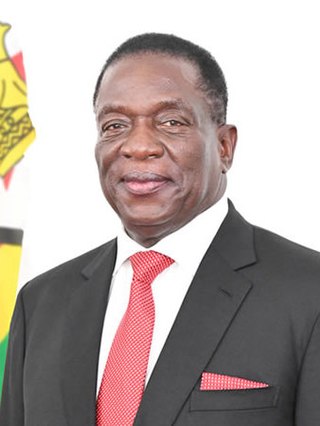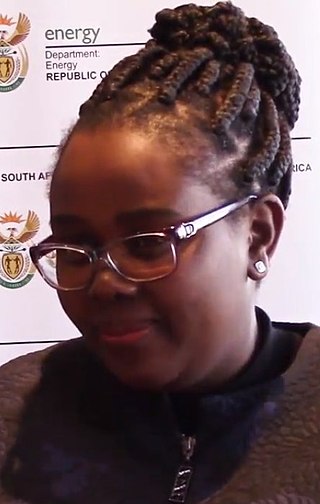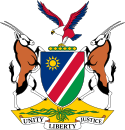
Politics of Namibia takes place in a framework of a semi-presidential representative democratic republic, whereby the President of Namibia is both head of state and head of government, and of a pluriform multi-party system. Executive power is exercised by both the president and the government. Legislative power is vested in the two chambers of Parliament. The judiciary is independent of the executive and the legislature.
A vice president or vice-president, also director in British English, is an officer in government or business who is below the president in rank. It can also refer to executive vice presidents, signifying that the vice president is on the executive branch of the government, university or company. The name comes from the Latin term vice meaning "in place of" and typically serves as pro tempore to the president. In some countries, the vice president is called the deputy president. In everyday speech, the abbreviation VP is used.

The president of the Republic of Namibia is the head of state and the head of government of Namibia. The president directs the executive branch of the Government of Namibia, as chair of the Cabinet and is the commander-in-chief of the armed forces, according to the Constitution of Namibia.

Hifikepunye Lucas Pohamba is a Namibian politician who served as the second president of Namibia from 21 March 2005 to 21 March 2015. He won the 2004 presidential election overwhelmingly as the candidate of SWAPO and was reelected in 2009. Pohamba was the president of SWAPO from 2007 until his retirement in 2015. He is a recipient of the Ibrahim Prize.
The Cabinet of South Africa is the most senior level of the executive branch of the Government of South Africa. It is made up of the president, the deputy president, and the ministers.

The prime minister of the Republic of Namibia is the leader of the Government of Namibia. The prime minister is appointed by the president of Namibia and co-ordinates the work of the Cabinet. They also advise and assist the president in the execution of the functions of government.

The deputy presidentof South Africa is the second highest ranking officer of the executive branch of the Government of South Africa. The deputy president is a member of the National Assembly and the Cabinet.

The Vice President of the Philippines is the second-highest official in the executive branch of the Philippine government and is the first in the presidential line of succession. The vice president is directly elected by the citizens of the Philippines and is one of only two nationally elected executive officials, the other being the president.

Daniel Kablan Duncan is an Ivorian politician. He previously served as Prime Minister of Ivory Coast from 11 December 1993 to 24 December 1999 and again from November 2012 to January 2017. He was Minister of Foreign Affairs from June 2011 to November 2012. He was also the first Vice President of Ivory Coast, after the recreation of this office, from January 2017 until 13 July 2020.

Emmerson Dambudzo Mnangagwa is a Zimbabwean politician who is serving as the third president of Zimbabwe since 2017. A member of ZANU–PF and a longtime ally of former President Robert Mugabe, he held a series of cabinet portfolios and he was Mugabe's first-vice president from 2014 until 2017, when he was dismissed before coming to power in a coup d'état. He secured his first full term as president in the disputed 2018 general election. Mnangagwa was re-elected in the August 2023 general election with 52.6% of the vote.
Jerry Lukiiko Ekandjo is a Namibian politician, former anti-apartheid activist and political prisoner. He is one of the founding members of the SWAPO Youth League and has been one of the most active internal leading members of the South West Africa People's Organization (SWAPO) during the liberation struggle. He spent eight years in prison on Robben Island after being charged for inciting violence in 1973.

Kembo Dugish Campbell Muleya Mohadi is a Zimbabwean politician and Vice-President of Zimbabwe since 8 September 2023. He previously served in the same role from 28 December 2017 to 1 March 2021, when he resigned. He briefly served as the Minister of Defence, Security and War Veterans in 2017. Previously he was Minister of State for National Security in the President's Office from 2015 to 2017 and Minister of Home Affairs from 2002 to 2015.

Nangolo Mbumba is a Namibian politician who is the fourth and current president of Namibia. He became president after the death of Hage Geingob, under whom he had served as the second Vice-president of Namibia from 2018 to 2024.

Immanuel Ngatjizeko was a Namibian politician and member of the ruling SWAPO Party. He held five ministerial portfolios from 2003 until his retirement in 2018.
Nickey Iyambo was a Namibian politician and physician who served as the first Vice President of Namibia.

Netumbo Nandi-Ndaitwah is a Namibian politician who is Namibia's third and current vice president since February 2024. She previously served as the deputy prime minister of Namibia from 2015 to 2024. Currently the SWAPO vice president, and has retained her position and is set to become the party's first female presidential candidate in November 2024. She has also served as Namibia's Minister of International Relations and Cooperation since December 2012. From March 2010 to December 2012, she was Minister of Environment and Tourism. Nandi-Ndaitwah is a member of SWAPO, Namibia's ruling party, and a long-time member of the National Assembly. In 2017, Nandi-Ndaitwah was elected vice-president of the Swapo Party at the party's 6th Congress. She is the first woman to serve in that position.
Erastus Amutenya Uutoni is a Namibian SWAPO politician who has served in the cabinet of Namibia since March 2010.

The second cabinet of Jacob Zuma was the cabinet of the government of South Africa between 25 May 2014 and 14 February 2018. It was formed by Zuma after his re-election in the 2014 general election, and it served until Zuma resigned as President of South Africa on 14 February 2018. Comprising 35 ministers, the cabinet changed in composition on several occasions between 2015 and 2017, most notably in a major cabinet reshuffle in March 2017.

Mondli Gungubele is a South African politician and trade unionist who is the current Deputy Minister of Communications and Digital Technologies and a member of the National Assembly of South Africa for the African National Congress. He previously served as Executive Mayor of the Ekurhuleni Metropolitan Municipality (2010–2016), as Deputy Minister of Finance (2018–2019), as Chairperson of the Social Development Committee (2019–2021) and as Minister in the Presidency (2021–2023).

Mmamoloko Tryphosa Kubayi is a South African politician who is the Minister of Human Settlements and a Member of the National Assembly for the African National Congress (ANC). She is also the current head of the African National Congress's economic transformation subcommittee in the national executive committee (NEC). She was the Minister of Energy in 2017, the Minister of Communications from 2017 to 2018, the Minister of Science and Technology from 2018 to 2019, and the Minister of Tourism from 2019 to 2021.



















